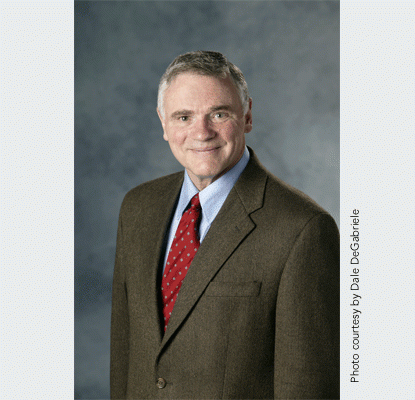Leroy Hood
While a student at the California Institute of Technology, Leroy Hood received words of wisdom from his mentor William Dreyer: "If you want to practice biology, do it on the leading edge and if you want to be on the leading edge, invent new tools for deciphering biological information." With this advice, Hood invented some of modern molecular biology's core instruments, profoundly impacting research and medicine. His DNA Sequencer made possible the Human Genome Project (to identify the nearly 30,000 genes in human DNA).
Hood and colleague Stephen Kent created the protein synthesizer, an instrument that assembles long peptides from amino acid subunits. Hood (and others) also invented the DNA synthesizer for synthesizing DNA fragments—a key development for gene mapping and the polymerase chain reaction.
Working with a team at Caltech, Hood developed a prototype automated DNA sequencer in 1985—a machine that rapidly determines the order of the four letters across the strings of DNA in cells. The process involves labeling each of the four DNA letters with different fluorescent dyes, using a laser to make the DNA chemicals glow in red, green, blue or orange, and then reading those signals by a computer. Over the next 17 years, this machine made DNA sequencing 3,000 times faster, facilitating the Human Genome Project, for which Hood was an early advocate and key player.
In 1992, Hood created the Department of Molecular Biotechnology at the University of Washington, succeeded by the Institute for Systems Biology in Seattle, WA—co-founded in 2000. Integrating biology, medicine, computation and technology, the Institute focuses on how systems operate by studying all of their elements together.
Inspired by his teachers while a young boy growing up in Montana, Hood has worked to improve science education in grades K-12, emphasizing analytical and inquiry based thinking.
Hood received his BS in Biology from Caltech (1960), his MD from Johns Hopkins University (1963), and his PhD in biochemistry from Caltech (1967). Hood was the recipient of the Lasker Award for Studies of Immune Diversity (1987), the Kyoto Prize for Advanced Technology (2002), The National Medal of Science (2011), the National Academy of Science Award for Chemistry in Service to Society (2017) and others. He has founded or co-founded 17 biotech companies, including Applied Biosystems, Amgen and NanoString that commercialize technologies.
Hood is a member of the National Academy of Sciences, the American Academy of Arts and Sciences, the National Academy of Engineering and the American Philosophical Society.
He is currently the Senior Vice President and Chief Scientific Officer at Providence St. Joseph Health and is also a professor and Chief Strategy Officer at the Institute for Systems in Biology, which he co-founded. Hood's strong dedication to finding answers in his research is driven by the desire to improve the health of people worldwide.


